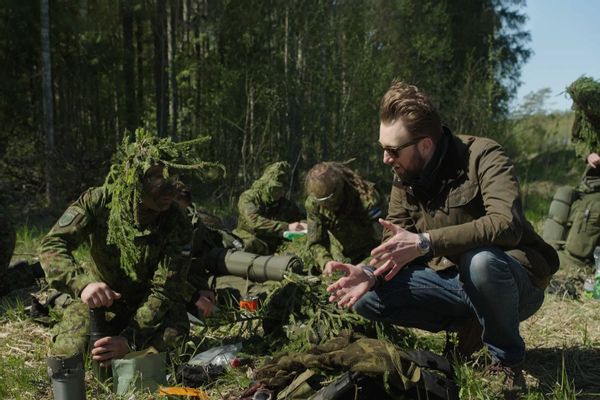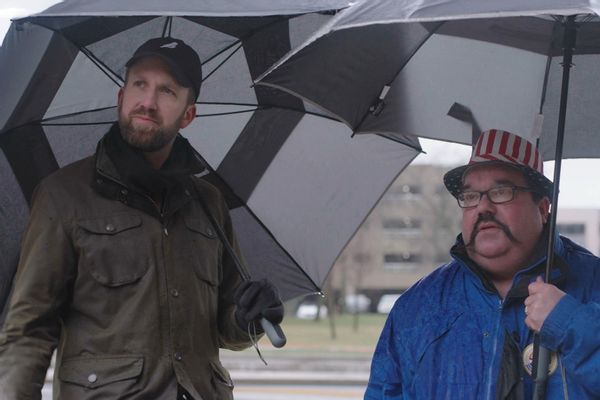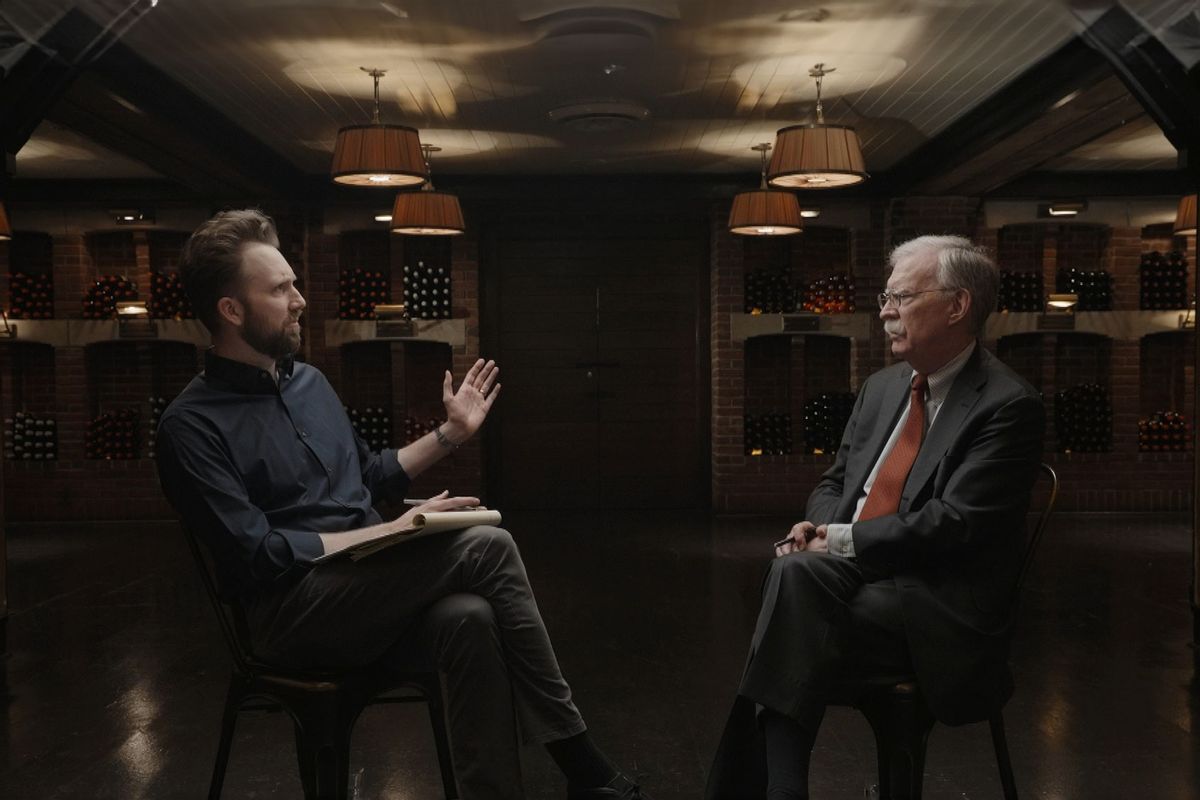Jordan Klepper’s field pieces for “The Daily Show” have taken him to places most progressives prefer to avoid. Trump rallies, mostly. “I’m this big, lanky, white guy. And I think people feel more comfortable and confiding some of these things to this person who they see, perhaps, as closer to an ally,” the correspondent told Salon in a recent interview conducted over Zoom.
That ease in his presence has netted Klepper a wealth of material for “Jordan Klepper Fingers The Pulse,” his regular journeys into the dark heart of the partisan divide. But some excursions produce broader examinations.
“The Daily Show Presents: Jordan Klepper Fingers The Pulse: Moscow Tools,” his latest special, is a nimble dive into how effectively Russian propaganda has insinuated itself into our political discourse. Klepper’s objective is stone-cold serious as always, even as he places a comedic spin on a topic that should scare all of us.
Similar to his 2022 special on the far-right’s obsession with Hungary, “Moscow Tools” grew out of Klepper noticing the changing MAGA-world conversation around Russia. When the same lies were used in Congress to slow down financial assistance to Ukraine, he realized this was a gateway to examining American gullibility.
“That’s what I essentially cover,” Klepper said. “And I think there are these big questions there of like, why are we so gosh darn gullible? How much of it is us being a pawn to misinformation, and how much of this is revealing what we actually want? Are we just stooges? Or are there people in the MAGA movement who want these more autocratic desires, and these powerful players who limit LGBTQ rights and the power of the press? They’re kind of big questions and frankly, I think they’re scarier questions.”
“Moscow Tools” has the distinction of showing Klepper in conversation with two unlikely allies in this fight to maintain Western democracy. One is Estonian Prime Minister Kaja Kallas, whom Klepper visits in her home country to discuss what the stakes are should Donald Trump return to the Oval Office and do as he’s promised, withdrawing from NATO.
The other, former Trump administration National Security Advisor John Bolton, sounded the alarm concerning his former boss’ threat to American democracy from a well-apportioned wine cellar.
Spending a decade with “The Daily Show” has given Klepper a reputation for tangling up his subjects in their own webs of illogic, including among some of the conservatives who agree to speak to him on camera. Bolton is not immune to this, although perhaps he recognizes Klepper is on his side of this urgent debate. It probably also has something to do with Klepper’s ethos of, in his words, listening with curiosity.
That principle takes him to other places in “Moscow Tools” that are just as unexpected as his interview locations with former and present world leaders and, as he explained in our conversation, represents a truer interpretation of what patriotism means.
The following interview has been edited for length and clarity.
First of all, watching you talk to John Bolton in a wine cellar made me think to myself, “Oh, that’s the nicest doomsday bunker I’ve ever seen.” Did you ever think that you would be in a situation where, to say nothing of the wine cellar-slash-bunker, you would be consulting him as a voice of wisdom?
Not at all. No. And I brought that up in the interview, although, it’s not in the special but . . . The fact that I’m sitting down with the prime minister of Estonia and John Bolton, both people who are afraid about Russian propaganda and how it’s affecting the GOP, to me is more just reflective of the weirdness of the time we’re in. I can’t say I had “wine cellar with John Bolton” on my bucket list, but you know, 2024 has a weird way of making strange bedfellows.
 Moscow Tools (Comedy Central)
Moscow Tools (Comedy Central)
Your segment where you spent time with the Estonian militia is also enlightening, especially when the person you’re speaking to tells you he’s preparing to be a choir director while he’s armed and wearing fatigues and assorted camouflage. What was that moment like for you, and what are you hoping that the image of that moment will convey?
Yeah. As a Michigan boy, I always feel most at home hanging out with militia. So even when I go abroad, I’m keeping an eye out for them. These specials happened fairly organically, and so when we notice something in the field, we want to explore it more.
This one provides some interesting opportunities for us to sit down with experts and try to use them to walk through Russian propaganda and show it in the field. And then when we started to hear the stories around Estonia — and more so, hearing stories in America, where there was just such a lack of actual information about what it meant to be threatened by Russia, and what it meant to be living underneath an oppressive Russian regime, we thought it was an opportunity for us to go there and talk to people.
So much gets lost in translation and social media and TikTok that when we decided we wanted to talk to the Estonian prime minister, we said we wanted to talk to real people as well. And the story comes up about the Estonian Defence League.
Quite frankly, it’s shocking to me to see people come together and fight a common enemy. This is what we were told about World War II, that there were these unifying moments where there was a larger enemy. When the enemy is at the gates, people put aside their differences, and they come together to battle for the common good.
“I can’t say I had ‘wine cellar with John Bolton’ on my bucket list, but you know, 2024 has a weird way of making strange bedfellows.”
And I feel like America has faced some threats, COVID being the most recent worldwide threat, and we haven’t seen this unifying moment where people come together. In fact, when I go out on the road and I talk to people, the biggest enemy that they see is usually their neighbor. It’s not a foreign adversary. It’s somebody on the left, it’s somebody who’s been too “woke,” somebody who wants to have a trans athlete in a middle school competition. That is their largest fear and threat.
And so hearing the story about the Estonian Defence League, these are people who are coming together because they actually are afraid for their families. They actually can look across the border and see a threat. They have a recent history of living under that oppressive, autocratic regime.
We need to talk to these people. We need to dispel some of these rumors and these images and lies that Tucker Carlson pushes on the MAGA faithful about like, this autocratic regime is beautiful. “Look at the subway, look at the baguettes!” No, look at the people in Estonia who have lived underneath this oppressive regime who are training — who are teachers, who are going to be choir conductors – who are putting their time aside because they are afraid. And they’re not talking about partisan politics. They’re talking about protecting democracy and freedom.
To me, that was so inspiring and an opportunity for us to just get their story told. It’s something that I felt was lost in this weird partisan American environment we’re in. And it’s surreal that it happens on a place like Comedy Central. But I think it’s more important than ever to talk to people who are actually affected by this and show that there are people who have more at stake than the . . . culture wars that we have back at home.
 Moscow Tools (Comedy Central)
Moscow Tools (Comedy Central)
It’s also a powerful image when you think about when we see images of militias in the news. A lot of that is in the context of Jan. 6, right? There’s all this whole idea of people kind of playing Weekend Warrior as if it’s a concept that they want to execute in real life without truly understanding the consequences.
I was there on Jan. 6 — working, to be clear. To be clear! And you’re right, there’s a lot of weekend warriors dressed in fatigues who train for one big issue and that issue was apparently to overthrow their own government. They were angry at, again, their neighbors.
I did a special, “Jordan Klepper Solves Guns,” where I spent a weekend with the Georgia state militia training in the woods. And there’s a lot of straw men they’re training to fight. Their heads are swimming with misinformation and these faux narratives of heroism. So getting to see in Estonia, all of that stripped away . . . they’re not doing it for glory, or for clicks, or Instagram likes or to get away from their kids on the weekends. They’re doing it because they want to protect their kids 365.
It is a wake-up call when people have more on the line than you do, when people aren’t getting caught up in what feels like fake arguments over the internet about stuff that actually isn’t affecting people’s lives, and it is just being used to have some sort of outrage competition. When you go into the woods, and you see people training for the things that actually could affect their family members, it really is a wake-up call.
For me, it was also a reminder that patriotism could be defined in perhaps a more earnest and true way than what I’ve been privy to these last few years.
I want to return to the idea of looking at this through the lens of comedy. I think that when Tucker Carlson went to Russia, afterward there was a lot of breaking down of all of the fallacies he perpetuated and Putin’s reaction of basically calling him a soft target. There was a tendency, I think, to laugh at it.
But I also think there’s a tendency on the part of what I would call the mainstream media, and however you’d characterize Chris Cuomo, to understand what it was that he was thinking. The theory is that doing so will help us to understand the MAGA tribe, those people who are locked in this specific kind of information silo. And I’m wondering whether you think this might affect that audience, either positively or negatively.
I find comedy is a very effective tool to frame issues in a way that perhaps a general population might not approach. . . . The “Fingers the Pulse” pieces are a little bit unique in that we do look for humor, we look for hypocrisy. But I also find them to be revelatory, because more often than not, what I get to do that most journalists don’t get to do is, I get to come in with a biased perspective. I get to ask follow-up questions, I get to say yes to their ideas to hopefully have them reveal more in the field than they normally would to somebody else, so that I can understand them a little bit more.
“It’s easy enough to sort of look at what’s happening with Russia misinformation, and just look at the useful idiots . . . But the scarier question is the other side of it: Is autocracy actually compelling to many Americans?”
Like when we spoke to [journalist] Julia Ioffe, who walked us through what the Kremlin’s talking points were, as far as how they wanted to get these narratives into American mainstream culture, how can I have that conversation, and then use my comedic skills and my fieldwork, to actually show the effects of Russian propaganda in conversation with the actual propaganda?
And so for me, that was a really exciting part of using comedy as a way to ignite an audience interest, and to show a contradiction and hypocrisy, but hopefully also to evolve what we’ve been doing and use that as proof of the Kremlin’s success. And so I’m hoping that we’re showing somewhat of a coherent narrative as to how that propaganda can find its way into the middle of Pennsylvania.
Want a daily wrap-up of all the news and commentary Salon has to offer? Subscribe to our morning newsletter, Crash Course.
Now, the effect that has on an audience is a much bigger conversation, I think. I don’t know if it’s getting inside the bubble of the people out there in MAGA world. I think we are in these silos in a way where I don’t know if they’re ingesting this comedy in any kind of a way and, more often than not, their knives are out. Because if it seems critical, then they won’t engage whatsoever. But I think we approach it more so not as a way of converting people, but hopefully as a way of articulating some of the chaos and, frankly, manipulation that we see day in and day out.
It’s easy enough to look at what’s happening with Russia misinformation, and just look at the useful idiots – and there are plenty of them in America, and that’s part of what Putin wants. But the scarier question is the other side of it: Is autocracy actually compelling to many Americans? And do we pretend like democracy is this thing that will just always exist when frankly, there are folks who may desire something completely different?
 Moscow Tools (Comedy Central)
Moscow Tools (Comedy Central)
And maybe that is because of Russia’s manipulation or outside manipulation. Maybe it’s because of naïveté. Or maybe it’s because that is a desire — a strongman, a conservative nation with a white leader might be something that people are actually pining for. Again: big, scary ideas, but hopefully, we can use whatever tools we have to kind of start to ask those questions because I think they are really percolating right now.
What you said about the difference between Estonia versus here is important, because in most cases when Americans are talking about their neighbor, they’re talking about the concept of them. I don’t think they’re talking about anyone they actually know and fear.
I think that’s 100% true. People are so angry about their neighbor, and they talk about bringing guns to their neighbor. The way in which people talk about the person on the other side of the aisle is so scary. And Jan. 6 was a goddamn s**tshow. The rhetoric got so high and there were a lot of bad actors there who had one goal in mind. And there are a lot of other people who had been talking about overthrowing the government and being so angry at their neighbor and then got caught up in something that was way beyond what they had expected.
So I do think it’s dangerous to have these conceptual talks about our anger and our fears, and where we want to seek vengeance. You look at this Trump campaign, it’s all about vengeance.
People are often like, “You went to Estonia?” Yes, we went to Estonia. There are other stories being told, where people are facing real consequences. Like, let’s hear these out before we get lost in the world of concept.
“The Daily Show Presents: Jordan Klepper Fingers The Pulse: Moscow Tools” is streaming on Paramount+, the “Daily Show” YouTube channel, CC.com and video on demand.
Read more
about this topic

